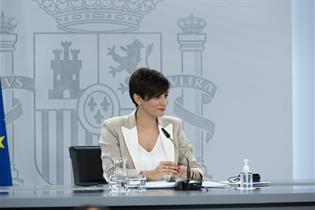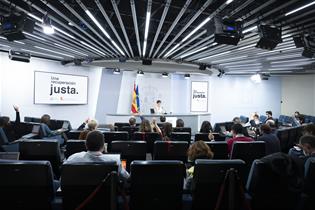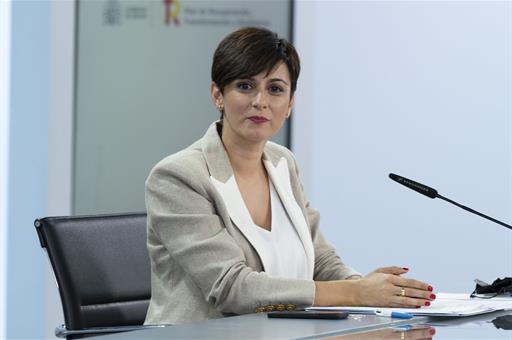Council of Ministers
The Government of Spain grants a subsidy of almost 19 million euros to the Canary Islands to alleviate the effects of the eruption of the volcano on La Palma
Council of Ministers - 2021.11.2
Moncloa Palace, Madrid
The Council of Ministers approved a direct grant of 18.8 million euros to repair the damage caused by the volcanic eruptions to the agricultural and fisheries sectors.
The Minister for Territorial Policy and Government Spokesperson, Isabel Rodríguez, has specified that, in the agricultural sector, the aid will be used to compensate the damage caused to the owners of agricultural or livestock farms that do not have coverage for extraordinary risks from the Insurance Compensation Consortium.
In the fisheries sector, the aid will go to shipowners and crews of vessels with home ports in Tazacorte who have suffered damage or have been unable to go out to fish, as well as to owners of vessels, fish markets and aquaculture installations at sea and on land who have suffered damage.
The spokesperson reiterated that the Government is closely following the evolution of the volcano and is making a major effort to overcome the administrative deadlines and give the most immediate response possible to the citizens of La Palma.
Isabel Rodríguez recalled that her department has already sent 500,000 euros, as a matter of urgency, to deal with emergencies on the road network and to facilitate mobility in the areas affected by the lava. This grant is in addition to other urgent support measures for the island, including direct aid to those affected and an extraordinary employment plan.
The compensation paid by the Insurance Compensation Consortium amounts to 20 million euros, as indicated by the spokesperson, who also specified that, as of 25 October, 337 workers have been placed on temporary redundancy plans. Isabel Rodríguez also referred to the Contingency Fund to help the island approved last week.
Talent recruitment and retention
 Foto: Pool Moncloa/Borja Puig de la BellacasaThe Government has agreed to authorise the advance processing of grants for University Teacher Training for 2021 with a budget of almost 99 million euros.
Foto: Pool Moncloa/Borja Puig de la BellacasaThe Government has agreed to authorise the advance processing of grants for University Teacher Training for 2021 with a budget of almost 99 million euros.
This action will allow the recruitment of 885 researchers for four years, except in the case of disability of the beneficiary, in which case they will have a maximum duration of six years.
The spokesperson explained that the measure aims to keep talent at university level and help students prepare for their PhDs. "The aim is to rejuvenate and increase the teaching and research capacity of the public university system, facilitating the incorporation of grant recipients into our public higher education system," she said.
These grants are in addition to those for research projects and pre-doctoral contracts approved by the Council of Ministers on 11 October.
Agreement with ONCE
The Council of Ministers has agreed to extend and update the agreements in force with the Spanish National Organisation of the Blind (ONCE) on cooperation, solidarity and competitiveness until 2031. The measure increases social investment, intensifies support for women with disabilities who are victims of sex-based violence, offers social coverage to isolated blind people in Spain and strengthens control mechanisms to ensure safe and responsible gambling.
Isabel Rodríguez reported that the measure will allow ONCE to create 25,000 new jobs for people with disabilities over 10 years, of which 5,000 will be in the field of science, sustainability or technology. Training for 100,000 people with disabilities and 3,000 scholarships for young people will also be developed.
The minister highlighted the social work carried out by the organisation in the exploitation of the granting of a licence to market lottery products as a responsible, social and safe gambling operator.
National Strategy for the Equality, Inclusion and Participation of the Roma People
The Government has approved the National Strategy for Equality, Inclusion and Participation of the Roma People, which will be in force until 2030.
The spokesperson indicated that the decision is in line with the Government's commitment to "social cohesion and progress" and pays special attention to gender equality within this group.
Adapting copyright to the digital environment
The Executive has agreed on the transposition of the EU directive establishing rules on the exercise of copyright and related rights applicable to certain online transmissions by broadcasting organisations and to retransmissions of radio and television programmes into Spanish law, as well as the directive on copyright and related rights in the Digital Single Market.
Isabel Rodríguez pointed out that the emergence of intermediaries in the digital environment has caused some harm to copyright owners in the market, which this measure corrects. In her opinion, with this regulation, the Government is responding to the demands of the cultural sector in our country.
Modernisation of the sports sector
The Council of Ministers has allocated 49 million euros to the regional governments to modernise the sports sector. This investment is part of the roll out of the Recovery, Transformation and Resilience Plan and will be implemented during the last quarter of 2021.
The spokesperson detailed that the funds will be used entirely to renovate the facilities of the High Performance and Sports Technification Centres throughout the country and to adapt them to the ecological and digital transition: "We will renew the energy efficiency of their equipment and improve their digital infrastructures".
Current Affairs
 Foto: Pool Moncloa/Borja Puig de la BellacasaAsked about the meeting held this morning between the President of the Government of Spain, Pedro Sánchez, the First Vice-President of the Government of Spain and Minister for the Economy and Digital Transformation, Nadia Calviño, and the Second Vice-President for Labour and Social Economy, Yolanda Díaz, the spokesperson said that it has contributed to advancing greater dialogue in the final stretch of negotiations to achieve the best agreement for workers and for the economic development of Spain.
Foto: Pool Moncloa/Borja Puig de la BellacasaAsked about the meeting held this morning between the President of the Government of Spain, Pedro Sánchez, the First Vice-President of the Government of Spain and Minister for the Economy and Digital Transformation, Nadia Calviño, and the Second Vice-President for Labour and Social Economy, Yolanda Díaz, the spokesperson said that it has contributed to advancing greater dialogue in the final stretch of negotiations to achieve the best agreement for workers and for the economic development of Spain.
Isabel Rodríguez reiterated that the Government is clear in its objective to tackle a process of modernisation of labour relations: "A new economic framework and a fair recovery require labour standards, a fair labour framework, which addresses and overcomes the difficulties of our country's workers, and which allows companies to improve conditions for these workers".
The spokesperson explained that the Government is committed to labour reform in the terms in which the President of the Government of Spain expressed himself in his investiture speech, in which the coalition agreement is drafted, and in which he has committed himself to Europe through the recovery plan sent to the European Commission.
Rodríguez argued that the Government wants to combat precariousness, seasonal employment and unemployment, especially among women and young people, "with tools that allow for balance in collective bargaining while clarifying the conditions to avoid such precariousness".
"We want an agreement that is fair to all parties, that is balanced. The aim is to build a new industrial relations model adapted to the 21st century economy, to the development and modernisation we are working on for our country and in this framework a fair recovery requires a fair industrial relations framework", she added.
Non official translation





